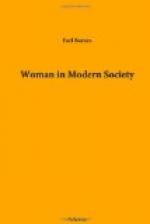All transitions are hard, and this one in which we are involved is most difficult of all; but no one can study the conditions around him without seeing that change is inevitable and that we are not going back to our earlier ideals. At the same time, no one can read the singularly scholarly and fair-minded presentations of Ellen Key[55] without feeling that she has a vision of the future.
[55] The Century of the Child. New York: G.P. Putnam’s Sons, 1907. Love and Marriage, G.P. Putnam’s Sons, 1911. Love and Ethics. New York: B.W. Huebsch, 1911.
With regard to the nature of the material plant in which the family should live, there are also two widely different ideals struggling for favor in the public mind, and for realization in practice. The one ideal, while recognizing the changes necessitated by modern conditions, would still seek to retain those features which have been supposed to make for family privacy, the kitchen, the nursery, and the garden. The other would frankly accept our changed conditions, and pass on to the larger groups of socialized buildings, with common kitchens, day nurseries, and parks.[56]
[56] See Woman and Economics, by CHARLOTTE PERKINS GILMAN, Boston: Small, Maynard & Co., 1898; and the writings of H.G. WELLS.
This question has been discussed in the chapter on industry, and it will be considered again in the following chapter. Meantime there can be no doubt that love is reticent so far as the outside world is concerned; and domesticity must always demand a large measure of privacy. It still remains to be proved that this can be secured, in the absence of a private kitchen, nursery and garden. Children, too, seem to need the personal care and constant love of mothers, and women seem to need a long period of loving and caring for a family to round out a deeply significant life.
To summarize this chapter we may say that the realization of romantic love, under conditions of domesticity, is necessary for men and women, and for the well-being of the race. Our present marriage system is defective, and needs to be corrected through the creation of a eugenic conscience. It should be taken out of the hands of the church and made more difficult by the state. Women’s property rights should be defined and safeguarded, and men and women should never live together when they are repugnant to each other.




